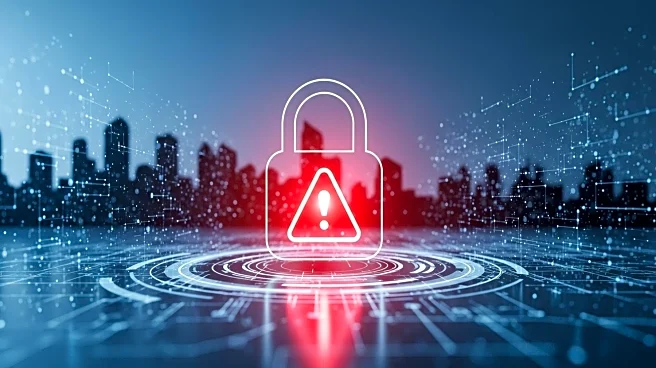What's Happening?
A recent report from cybersecurity firm Guardz highlights a significant increase in ransomware attacks targeting small businesses and municipal organizations in the first half of 2025. The report indicates that the number of weekly cyberattacks on small businesses nearly doubled compared to the same period last year, with over 80% of these attacks focusing on credential theft. The accessibility of attack-as-a-service offerings on the dark web has lowered the barrier for inexperienced threat actors to launch effective campaigns. Municipalities, such as the City of St. Paul, Minnesota, have also been targeted, resulting in severe disruptions to public services and the shutdown of municipal information systems. The attack on St. Paul was attributed to the ransomware group Interlock, which leaked 43 gigabytes of stolen data. The city refused to pay the ransom and opted to restore data from backups.
Why It's Important?
The surge in ransomware attacks poses a significant threat to small businesses and municipal organizations, which often lack the resources and defenses of larger enterprises. This trend underscores the urgent need for improved cybersecurity measures and proactive support from managed service providers (MSPs). The attacks can lead to substantial disruptions in public services and financial losses, highlighting vulnerabilities in outdated legacy systems and insufficient IT resources. The situation calls for municipalities and SMBs to prioritize cybersecurity infrastructure, talent acquisition, and public-private partnerships to enhance their defenses against increasingly sophisticated cyber threats.
What's Next?
In response to the growing threat, municipalities and small businesses are encouraged to audit their existing infrastructure to identify weaknesses and prioritize cybersecurity improvements. Immediate steps include ensuring systems are patched and updated, compartmentalizing systems to prevent the spread of incidents, and having a clear incident response plan. Public-private partnerships and reevaluating procurement processes are recommended to augment city capacity and attract top cybersecurity talent. The focus will be on building resilient and secure systems to withstand future attacks.
Beyond the Headlines
The increasing frequency of ransomware attacks raises ethical and legal concerns regarding data privacy and the responsibility of organizations to protect sensitive information. The attacks also highlight the need for a cultural shift towards prioritizing cybersecurity in organizational strategies and public policy. Long-term implications may include changes in regulatory frameworks and increased investment in cybersecurity education and training.










